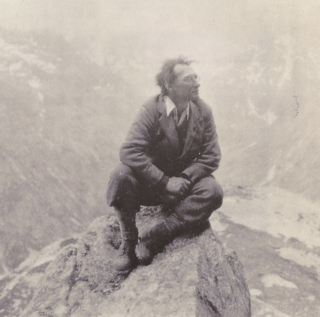
Literary theory is the systematic study of the nature of literature and of the methods for literary analysis. Since the 19th century, literary scholarship includes literary theory and considerations of intellectual history, moral philosophy, social philosophy, and interdisciplinary themes relevant to how people interpret meaning. In the humanities in modern academia, the latter style of literary scholarship is an offshoot of post-structuralism. Consequently, the word theory became an umbrella term for scholarly approaches to reading texts, some of which are informed by strands of semiotics, cultural studies, philosophy of language, and continental philosophy.

Literary criticism is the study, a genre of arts criticism, evaluation, and interpretation of literature. Modern literary criticism is often influenced by literary theory, which is the philosophical discussion of literature's goals and methods. Though the two activities are closely related, literary critics are not always, and have not always been, theorists.
Wolfgang Iser was a German literary scholar.
In literary criticism, close reading is the careful, sustained interpretation of a brief passage of a text. A close reading emphasizes the single and the particular over the general, via close attention to individual words, the syntax, the order in which the sentences unfold ideas, as well as formal structures.

Reader-response criticism is a school of literary theory that focuses on the reader and their experience of a literary work, in contrast to other schools and theories that focus attention primarily on the author or the content and form of the work.

Azar Nafisi is an Iranian-American writer and professor of English literature. Born in Tehran, Iran, she has resided in the United States since 1997 and became a U.S. citizen in 2008.

Ivor Armstrong Richards CH, known as I. A. Richards, was an English educator, literary critic, poet, and rhetorician. His work contributed to the foundations of the New Criticism, a formalist movement in literary theory which emphasized the close reading of a literary text, especially poetry, in an effort to discover how a work of literature functions as a self-contained and self-referential æsthetic object.

Cleanth Brooks was an American literary critic and professor. He is best known for his contributions to New Criticism in the mid-20th century and for revolutionizing the teaching of poetry in American higher education. His best-known works, The Well Wrought Urn: Studies in the Structure of Poetry (1947) and Modern Poetry and the Tradition (1939), argue for the centrality of ambiguity and paradox as a way of understanding poetry. With his writing, Brooks helped to formulate formalist criticism, emphasizing "the interior life of a poem" and codifying the principles of close reading.
Literary fiction, mainstream fiction, non-genre fiction, serious fiction, high literature, artistic literature, and literature are labels that, in the book trade, refer to market novels that do not fit neatly into an established genre ; or, otherwise, refer to novels that are character-driven rather than plot-driven, examine the human condition, use language in an experimental or poetic fashion, or are simply considered serious art.
"The Death of the Author" is a 1967 essay by the French literary critic and theorist Roland Barthes (1915–1980). Barthes's essay argues against traditional literary criticism's practice of relying on the intentions and biography of an author to definitively explain the "ultimate meaning" of a text. Instead, the essay emphasizes the primacy of each individual reader's interpretation of the work over any "definitive" meaning intended by the author, a process in which subtle or unnoticed characteristics may be drawn out for new insight. The essay's first English-language publication was in the American journal Aspen, no. 5–6 in 1967; the French debut was in the magazine Manteia, no. 5 (1968). The essay later appeared in an anthology of Barthes's essays, Image-Music-Text (1977), a book that also included his "From Work to Text".

The National Book Foundation (NBF) is an American nonprofit organization established, "to raise the cultural appreciation of great writing in America." Established in 1989 by National Book Awards, Inc., the foundation is the administrator and sponsor of the National Book Awards, a changing set of literary awards inaugurated in 1936 and continuous from 1950. It also organizes and sponsors public and educational programs.
Derek Attridge FBA is a South African-born British academic in the field of English literature. He is Emeritus Professor of English and Related Literature at the University of York, having retired from the university in 2016, and is a Fellow of the British Academy. Attridge undertakes research in South African literature, James Joyce, modern fiction, deconstruction and literary theory and the history and performance of poetry. He is the author or editor of thirty books, and has published eighty articles in essay collections and a similar number in journals. He has held a Guggenheim Fellowship and a Leverhulme Research Professorship, and Fellowships at the National Humanities Center, the Bogliasco Foundation, the Camargo Foundation, and The Stellenbosch Institute for Advanced Study, the Freiburg Institute for Advanced Studies, and All Souls and St. Catherine's Colleges, Oxford. Among the visiting positions he has held have been professorships at the American University of Cairo, the University of Sassari, the University of Cape Town, Northwestern University, Wellesley College, and the University of Queensland.
Critical reading is a form of language analysis that does not take the given text at face value, but involves a deeper examination of the claims put forth as well as the supporting points and possible counterarguments. The ability to reinterpret and reconstruct for improved clarity and readability is also a component of critical reading. The identification of possible ambiguities and flaws in the author's reasoning, in addition to the ability to address them comprehensively, are essential to this process. Critical reading, much like academic writing, requires the linkage of evidential points to corresponding arguments.

Mimi Reisel Gladstein is a professor of English and Theatre Arts at the University of Texas at El Paso. Her specialties include authors such as Ayn Rand and John Steinbeck, as well as women's studies, theatre arts and 18th-century British literature. In 2011 she was named to the El Paso Historical Hall of Honor.
Rita Felski is an academic and critic, who holds the John Stewart Bryan Professorship of English at the University of Virginia and is a former editor of New Literary History. She is also Niels Bohr Professor at the University of Southern Denmark (2016–2021).

Harold Bloom was an American literary critic and the Sterling Professor of Humanities at Yale University. In 2017, Bloom was called "probably the most famous literary critic in the English-speaking world." After publishing his first book in 1959, Bloom wrote more than 50 books, including over 40 books of literary criticism, several books discussing religion, and one novel. He edited hundreds of anthologies concerning numerous literary and philosophical figures for the Chelsea House publishing firm. Bloom's books have been translated into more than 40 languages. Bloom was elected to the American Philosophical Society in 1995.

A classic is a book accepted as being exemplary or particularly noteworthy. What makes a book "classic" is a concern that has occurred to various authors ranging from Italo Calvino to Mark Twain and the related questions of "Why Read the Classics?" and "What Is a Classic?" have been essayed by authors from different genres and eras. The ability of a classic book to be reinterpreted, to seemingly be renewed in the interests of generations of readers succeeding its creation, is a theme that is seen in the writings of literary critics including Michael Dirda, Ezra Pound, and Sainte-Beuve. These books can be published as a collection or presented as a list, such as Harold Bloom's list of books that constitute the Western canon. Although the term is often associated with the Western canon, it can be applied to works of literature from all traditions, such as the Chinese classics or the Indian Vedas.
Alastair J. Minnis is a Northern Irish literary critic and historian of ideas who has written extensively about medieval literature, and contributed substantially to the study of late-medieval theology and philosophy. Having gained a first-class B.A. degree at the Queen's University of Belfast, he matriculated at Keble College, Oxford as a visiting graduate student, where he completed work on his Belfast Ph.D., having been mentored by M.B. Parkes and Beryl Smalley. Following appointments at the Queen's University of Belfast and Bristol University, he was appointed Professor of Medieval Literature at the University of York; also Director of the Centre for Medieval Studies and later Head of English & Related Literature. From 2003 to 2006, he was a Humanities Distinguished Professor at Ohio State University, Columbus, from where he moved to Yale University. In 2008, he was named Douglas Tracy Smith Professor of English at Yale. He retired in 2018, and is now living in the Scottish Borders. Professor Minnis is a Fellow of the English Association, UK (2000), a Fellow of the Medieval Academy of America (2001), and an Honorary Member of the Royal Irish Academy (2016). From 2012 to 2014, he served as president of the New Chaucer Society. Currently, he is Vice-President of the John Gower Society. He was General Editor of the Cambridge University Press series Cambridge Studies in Medieval Literature from 1987 to 2018, and holds an honorary master's degree from Yale (2007) and an honorary doctorate from the University of York (2018). The University of York also bestowed on him the honorific title of Emeritus Professor of Medieval Literature (2018).
Arther Storrey Trace Jr. was an author, educator, educational critic and reformer, and academic professor. Trace was best known as the author of What Ivan Knows that Johnny Doesn't (1961), published by Random House during the Sputnik era, at the height of the Cold War with the Soviet Union. In this book, he sought to upend the then commonly held opinion that although the United States seemed to lag behind the Soviet Union in the teaching of science and mathematics, it was superior in the teaching of the humanities.

The Big Jubilee Read is a 2022 campaign to promote reading for pleasure and to celebrate the Platinum Jubilee of Elizabeth II. A list of 70 books by Commonwealth authors, 10 from each decade of Elizabeth II's reign, was selected by a panel of experts and announced by the BBC and The Reading Agency on 18 April 2022.










